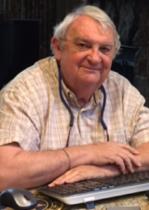Enhancing Mathematics Education using Technology
(1992 - 1995)
The University of Arizona Department of Mathematics offers a National Science Foundation sponsored faculty enhancement program directed at the thoughtful introduction of modern technology into the undergraduate mathematics classroom using The University of Arizona Mathematical Software. The program deals primarily with college algebra, trigonometry, calculus, vector calculus, ordinary differential equations, linear algebra, graph theory, and finite mathematics.
Over the past few years, with the aid of other faculty members and students, Drs. Lomen and Lovelock have been creating commercial level educational software for use in and out of the classroom. This software has been designed and tested to have a specific educational impact. It can be used by instructors for classroom demonstrations as well as by students for the exploration of and the solving of mathematical problems.
Rather than create one massive comprehensive package, it was decided to write "small packages." Each package is designed to do one thing very well, and to be used with little or minimal training. In general, these programs require 640K and a CGA graphics card. They are all self-documenting, have "pull down" menus and context sensitive help. One of the software packages is an English to Spanish mathematics dictionary that was created jointly with Pima Community College, Tucson, AZ.
All the software created can be freely copied without fear of legal reprisals. Each package contains the following statement: "This program may be freely distributed by any means, including bulletin boards, provided that there is no fee or charge or consideration of any kind which is in excess of $8. However, we retain all the rights to this program." We encourage anyone to make copies of the software via the World Wide Web or by writing to:
Mathematical Software
Department of Mathematics
University of Arizona
Tucson, AZ 85721
"Enhancing Mathematics Education Using Technology" workshops were developed in view of the fact that it takes planning and practice to use the software effectively. Approximately eight workshops are offered each year which are aimed at teachers (college and high school) that are using or are planning to use the mathematical software in their classes. These workshops are held at national mathematics meetings, The University of Arizona, and other universities in the United States and Mexico.
These workshops consist of two components:
- a ten day workshop, where participants learn about technology in the classroom and create instructional materials which they can take back with them. The participants are shown what the software can do mathematically before they use it themselves. The participants are then shown how the software can be used educationally, and finally they are given help to implement these ideas in their particular courses. No previous computer skills are required of the participants. About 35% of the participants' time is devoted to being shown what to do, and about 65% is devoted to creating the specifics for this workshop to impact their courses.
- a three day follow-up meeting held five months later where participants report on their activities, sharing the ideas and experiences they gained from implementing technology in the classroom.
The University of Arizona Mathematical Software and the Enhancing Mathematics Education Using Technology workshops are on-going projects that have received funding from:
- The National Science Foundation Calculus Initiative
- The National Science Foundation Latin America Cooperative Research Program
- The State of Arizona, USA
- Universidad de Sonora -- el Estado de Sonora, Mexico
- The University of Arizona -- Dean of Science
- Science Center, Culiacan, Mexico
To start a similar program that helps incorporate technology into the classroom, contact a local department of mathematics chairperson, dean of science, university provost, The National Science Foundation, or other agencies of support. Request start-up funds for computers, computer time, and travel costs.


